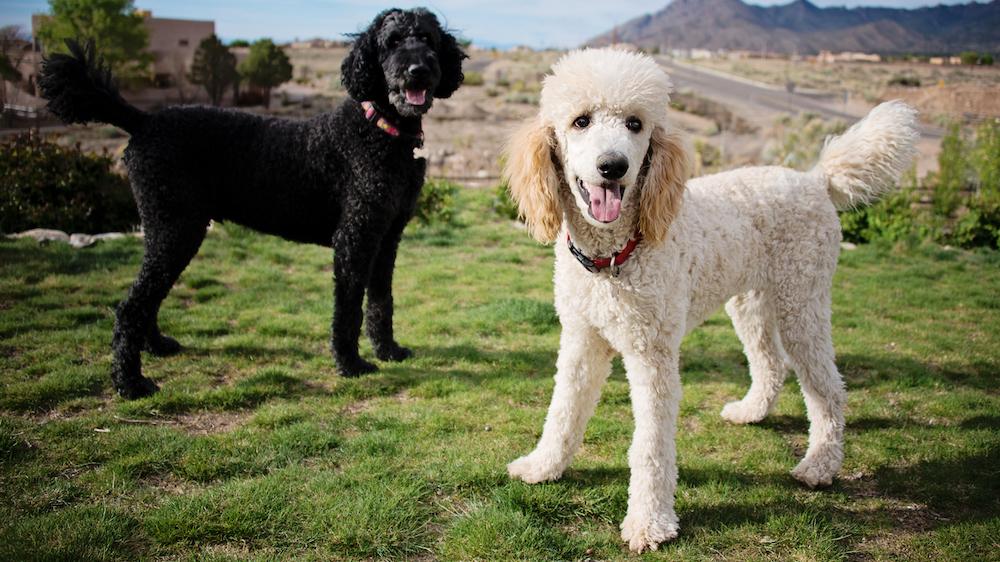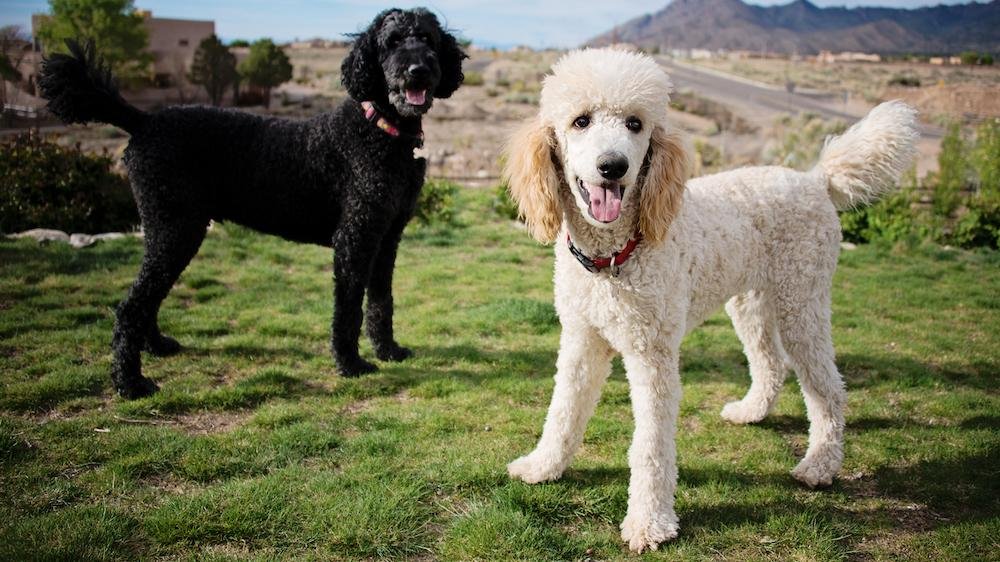When it comes to pets, poodles may seem like a popular choice, but there are several reasons why they are considered the worst. Did you know that poodles are actually one of the most high-maintenance dog breeds? Their curly and dense coat requires constant grooming, which can be both time-consuming and expensive. This is just one of the many factors that make poodles a less preferred option for pet owners.
Besides their grooming needs, poodles have a reputation for being overly energetic and high-strung. This can make them difficult to handle, especially for those who are not experienced or knowledgeable about their specific needs. Additionally, poodles are prone to certain health issues, such as hip dysplasia and eye problems, which can result in frequent visits to the veterinarian. Considering these factors, it becomes clear why poodles are often regarded as one of the worst dog breeds to own.
If you’re looking for a dog breed with a difficult temperament, poodles might not be your first choice. Poodles, with their high energy levels and intelligence, require lots of mental and physical exercise. They can also be prone to separation anxiety if not properly trained and socialized. Additionally, their curly fur requires regular grooming, which can be time-consuming and costly. However, poodles are not inherently bad dogs. With proper care and training, they can be loyal and loving companions.

Are Poodles Really the Worst?
Poodles often get a bad reputation, but are they really the worst? Let’s take a closer look at some of the reasons why poodles are often considered less favorable compared to other dog breeds. While every dog breed has its own unique traits and characteristics, poodles may not always be the best fit for everyone. It’s important to understand these reasons in order to make an informed decision when considering Poodles as pets.
1. High Maintenance Grooming
One of the main reasons why poodles have a reputation for being the worst is their high maintenance grooming needs. Poodles have a thick, curly coat that requires regular brushing to prevent matting and tangling. Additionally, they need to be professionally groomed every 4-6 weeks, which can be quite expensive. Not everyone has the time, energy, or resources to devote to such demanding grooming needs, making poodles a less practical choice for some.
Furthermore, poodles are known to be more prone to skin conditions and allergies compared to other breeds. This means that their grooming routine may require additional steps, such as special shampoos or medicated treatments, to keep their skin healthy. All of these factors add up to a significant amount of time, effort, and expense.
2. Intelligence and Energy
Poodles are highly intelligent and energetic dogs. While this can be a positive trait for some owners who want an active and trainable dog, it can also be a downside for others. Poodles require mental and physical stimulation to prevent boredom, which can lead to destructive behaviors if not properly managed.
In addition, their intelligence can make them more apt to problem-solving, which can sometimes be a challenge for inexperienced owners. Poodles need consistent training and mental stimulation to thrive, otherwise, their intelligence can turn into stubbornness and create difficulty in obedience training.
3. Potential Health Issues
Like many purebred dogs, poodles are prone to certain health issues. Standard poodles, in particular, may be susceptible to hip dysplasia, Addison’s disease, and certain types of cancers. Miniature and toy poodles may also have their own set of health concerns, such as patellar luxation and dental problems.
These potential health issues can result in costly veterinary bills and additional care requirements. It’s important for potential poodle owners to be aware of these risks and be prepared for the possibility of managing health conditions throughout the dog’s life.
4. High Energy Levels
Poodles are known for their high energy levels, which can be both a positive and a negative aspect depending on the owner’s lifestyle. While their energy can make them great companions for active individuals who enjoy outdoor activities or sports, it can also be overwhelming for those who prefer a more laid-back lifestyle.
If their exercise needs are not met, poodles can become restless and exhibit undesirable behaviors such as excessive barking, digging, or chewing on furniture. It’s crucial to provide them with regular exercise and mental stimulation to prevent behavioral issues.
5. Allergies and Shedding
Poodles are often recommended for people with allergies or asthma since they are considered hypoallergenic. However, it’s important to note that no dog breed is truly hypoallergenic. Poodles may still produce allergens, such as dander, saliva, or urine, that can trigger allergies in sensitive individuals.
Additionally, poodles do shed, albeit minimally. Their curly hair traps shed hair within the coat, which can lead to matting if not properly maintained. Regular grooming and brushing can help minimize shedding and prevent matting.
6. Not Suitable for Everyone
While poodles can make fantastic pets for the right owners, they are not suitable for everyone. Their grooming needs, energy levels, and potential health issues make them a more challenging choice for individuals who are not fully prepared to meet their requirements.
Potential poodle owners should thoroughly research the breed, consult with reputable breeders or animal shelters, and spend time with poodles to assess their compatibility. Responsible ownership involves being able to provide the necessary care, attention, and resources to meet the specific needs of any dog breed, including poodles.
- Poodles require regular grooming, which can be time-consuming and expensive.
- Their high intelligence and energy levels require mental and physical stimulation.
- Potential health issues may require additional veterinary care.
- Their high energy levels may not be suitable for all lifestyles.
- Poodles can trigger allergies in sensitive individuals and still shed minimally.
- Poodles are not suitable for everyone and require responsible ownership.
The Verdict: Is the Poodle Really the Worst?
Poodles may have certain traits and characteristics that make them a less ideal choice for some individuals, but it’s important to remember that no dog breed is inherently “the worst.” Every dog breed has its own unique qualities and considerations, and what may work for one person may not work for another.
If you are considering a poodle as a pet, it’s crucial to assess your own lifestyle, resources, and capabilities to meet their specific needs. Responsible ownership involves understanding and being prepared for the challenges that come with owning any dog breed.
Key Takeaways: Why Poodles Are the Worst?
1. Poodles require regular grooming due to their curly fur.
2. Poodles can be high maintenance and need lots of attention and mental stimulation.
3. They are prone to certain health issues like hip dysplasia and eye problems.
4. Poodles can be a bit aloof and not as friendly as other dog breeds.
5. Their intelligence and energy levels can sometimes make them challenging to train.
Frequently Asked Questions
Here are some common questions and answers related to why poodles are considered the worst:
1. Are poodles really the worst breed?
No, poodles are not the worst breed. Every dog breed has its own unique traits and characteristics. Poodles, despite their reputation, are actually highly intelligent, loyal, and trainable dogs. They excel in various activities such as agility, obedience, and even therapy work. It’s important to remember that a dog’s behavior is greatly influenced by how they are raised and trained, rather than purely their breed.
Furthermore, poodles come in different sizes, including standard, miniature, and toy. Each size has its own set of characteristics and energy levels, so it’s essential to understand the specific needs and requirements of the size you choose. It’s unfair to generalize poodles as the worst breed when many poodle owners can attest to their loving and affectionate nature.
2. Why do some people consider poodles to be difficult dogs?
Some people may consider poodles to be difficult dogs due to misconceptions or lack of understanding about the breed. One reason is their high intelligence. Poodles are one of the most intelligent dog breeds, which means they require mental stimulation and consistent training to keep them engaged and prevent boredom. Without proper mental and physical exercise, they can become restless and exhibit undesirable behaviors.
Additionally, poodles have a thick, curly coat that requires regular grooming to prevent matting and maintain their appearance. This grooming process can be time-consuming and may require professional assistance. However, with proper grooming habits and regular maintenance, poodles can have a stunning appearance that matches their playful and elegant nature.
3. Do poodles have health issues that make them the worst?
No breed is immune to health issues, and poodles are no exception. However, it’s unfair to label them as the worst breed based solely on health concerns. Poodles are generally considered to be a healthy breed with a long lifespan, especially compared to some other dog breeds.
Like all dogs, poodles can be prone to certain genetic and hereditary health conditions. These may include hip dysplasia, progressive retinal atrophy, and certain skin allergies. It’s essential for poodle owners to be aware of these potential health issues and choose a responsible breeder who conducts health screenings for their breeding dogs. Regular veterinary check-ups and a balanced diet can help mitigate the potential risks and ensure a happy and healthy life for poodles.
4. Can poodles be aggressive and dangerous?
While any dog has the potential to display aggression, it is not accurate to label poodles as inherently aggressive or dangerous. Poodles, when raised in a loving and responsible environment, are known for their friendly and sociable nature.
Aggression in dogs is often a result of improper training, socialization, or mistreatment. It is crucial for poodle owners to prioritize early socialization, positive reinforcement training methods, and consistent leadership to prevent any potential aggression issues. As with any dog, it is the owner’s responsibility to provide a secure and nurturing environment that fosters a well-behaved and balanced poodle.
5. Are poodles suitable for families with children?
Yes, poodles can be great companions for families with children. Poodles have a playful and energetic nature, making them well-suited for active families. They can form strong bonds with children and often get along well with other pets too.
However, it’s important to supervise interactions between young children and dogs to ensure both parties are safe. Teaching children how to properly handle and interact with dogs, as well as setting boundaries and rules for both the children and the dog, is crucial in maintaining a harmonious relationship. Responsible ownership and proper training are key to having a poodle that is a beloved and valued member of the family.

7 Reasons You Should NOT Get a Standard Poodle
In summary, poodles can be challenging pets due to several reasons. Firstly, their high maintenance grooming needs can be time-consuming and costly. Secondly, their high energy levels require constant exercise and mental stimulation. Additionally, poodles can be prone to certain health issues, which may result in costly veterinary care.
Furthermore, poodles have a reputation for being stubborn and difficult to train. This can make them frustrating for first-time dog owners or those seeking a low-maintenance pet. While poodles can be intelligent and affectionate companions, their specific needs and temperament make them less suitable for everyone.
